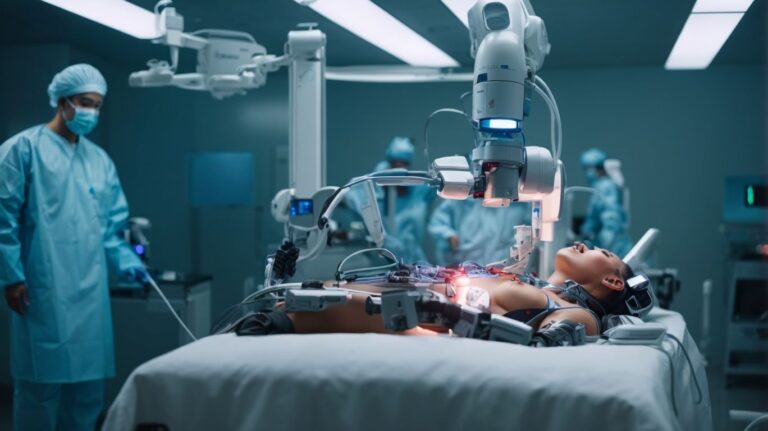Understanding Surgical Technology: Key Roles, Procedures, and Benefits
Surgical techs or technologists are professionals who have an important job in the operating room. They give surgeons help during operations, to make sure that the surgery goes well.
These experts know what tools are needed and make sure they are ready and in good condition. They also pay attention to details and can help surgeons by passing them the right instruments and holding things in place.
A career in surgical technology is a great choice. It has lots of possibilities for growth and you can help people. If you love healthcare, have an eye for detail, and like fast-paced environments, this could be the perfect job for you. Don’t miss out on your chance to save lives each day!
What is Surgical Technology?
Surgical technology is a field that combines science, technology, and medicine to support surgeries. Skilled professionals assist surgeons during operations. They ensure the instruments are sterilized and available. Plus, they set up the operating room with all necessary equipment.
Surgical technologists must also ensure a safe and sterile environment in the operating room. They prevent infections by following sterilization techniques and maintaining cleanliness during surgery.
They are proficient in handling advanced medical equipment like robotic systems or laser devices. They work with the surgical team to ensure communication and coordination during the procedure.
This field is constantly evolving with technological advancements. Professionals must stay updated with new techniques and equipment to provide the best care possible to patients. This helps ensure surgeries are performed efficiently and reduces risks while enhancing patient outcomes.
To practice legally, surgical technologists need to complete an accredited program and pass a national certification exam. This process guarantees they follow high standards of competency and professionalism.
History of Surgical Technology
The history of surgical technology spans centuries. Early tools were crude, but today they are advanced. Ancient civilizations such as Egypt, Greece, and Rome used flint knives and bronze scalpels. During the Middle Ages, religious beliefs influenced surgery. The Renaissance brought progress with anatomical knowledge. Ambroise Paré and Andreas Vesalius revolutionized surgery.
The 19th century saw a turning point. Anesthesia and antiseptics allowed for longer and more complex procedures. Joseph Lister’s use of carbolic acid reduced post-operative infection mortality.
Modern times have seen astonishing advances in surgical technology. Minimally invasive techniques provide smaller incisions and faster recoveries. Robotic-assisted surgery enhances precision and dexterity. Imaging technology gives surgeons more clarity.
Dr. Christiaan Barnard’s first successful heart transplant in 1967 was a groundbreaking achievement. It paved the way for organ transplantation and showed the importance of surgical technology in modern medicine.
Surgical Technology in Practice
A table can show the practical aspects of Surgical Technology. It includes:
- Minimally Invasive Surgery: Small incisions with special instruments and cameras to reduce tissue damage.
- Robotic-Assisted Surgery: Robots enhance surgical precision and control.
- Computer-Aided Navigation: 3D maps of a patient’s anatomy to help plan and execute surgeries.
- Laser Technology: Lasers used for eye surgery, dermatology treatments, and minimally invasive surgeries.
- Smart Instruments: Detect vital information during surgery and give real-time feedback to surgeons.
Surgical technology is rapidly evolving. One example of this is Dr. James Andrews, an orthopedic surgeon who pioneered arthroscopic surgery techniques. His expertise in using surgical technology enabled him to treat many professional athletes, allowing them to continue their careers.
Advancements and Innovations in Surgical Technology
Surgical technology is ever-evolving! Amazing advancements and innovations are transforming the way surgeries are done. These have been helping patients and reducing surgical risks. Let’s look at some of these cutting-edge technologies:
| Advancements | Description |
|---|---|
| Robotic-assisted Surgery | Surgeons use robotic systems to perform surgery |
| Minimally Invasive Surgery | Small incisions, faster recovery times |
| 3D Printing | Customized surgical tools and implants |
| Telemedicine | Remote consultations between surgeons and patients |
More unique technologies are being developed for the future of surgery. Like bioprinting, virtual reality surgical simulations and AI-assisted surgery.
Surgeons and healthcare professionals must stay updated with the latest advancements. They can provide better patient care and stay ahead in their field. Don’t miss out on what these innovations can offer. Keep informed, embrace change and explore possibilities. Your patients deserve the best possible care. Take advantage of these advancements and push the boundaries of what’s possible in surgery.
Current and Future Trends in Surgical Technology
Surgical tech is always changing, with trends now and into the future shaping the field in amazing ways. Let’s check out some of these awesome developments:
| Trend | Description |
| Robot-Assisted Surgery | Using robotic systems to help surgeons do complex procedures with greater precision. |
| 3D Printing in Healthcare | Making surgical tools and implants with cutting-edge 3D printing tech. |
| Augmented Reality (AR) | Using AR in surgical processes, providing guidance and visuals during operations. |
Plus, telemedicine has let remote surgical help happen. Expert surgeons can guide and support colleagues worldwide. AI in surgical planning and decision-making has improved patient outcomes through more accurate diagnoses.
It’s essential for healthcare institutions to invest in new infrastructure and provide training. This will help deliver better care and increase efficiency. Regular evaluations and audits should be done to ensure safe usage of new technologies.
Conclusion
Surgeons now rely on surgical technology to perform complex medical procedures accurately and quickly. From robots to imaging techniques, surgical tech has revolutionized medicine.
Gone are the days when surgeons had to do everything by themselves. Now, they have tools to enhance abilities and improve patient results.
One example is laparoscopic surgery. Here, small incisions and a camera are used with special instruments. This reduces pain, scarring and speeds up recovery.
In orthopedics, computer-assisted navigation systems increase accuracy of joint replacement surgeries. This leads to better implant positioning and patient satisfaction.
Surgical tech has a long history. Early civilizations experimented with primitive surgical instruments made from stone and bone. Anesthesia, sterilization and imaging technologies all developed over time, leading to modern surgical tech.
Surgical tech continues to evolve. New techniques and devices are introduced, helping surgeons reach remarkable outcomes. Every day, the future of surgery gets brighter as innovations shape the field.
Frequently Asked Questions
Q: What is surgical technology?
A: Surgical technology, also known as surgical technologist, is a healthcare profession responsible for assisting surgeons during surgical procedures. They ensure the operating room is prepared, sterilize equipment, and assist with surgical instruments, among other tasks.
Q: What qualifications are required to become a surgical technologist?
A: To become a surgical technologist, you typically need a postsecondary certificate or an associate degree from an accredited surgical technology program. Some states may also require certification, which can be obtained through the National Board of Surgical Technology and Surgical Assisting.
Q: What skills are necessary to excel in surgical technology?
A: Strong attention to detail, manual dexterity, and the ability to work well under pressure are essential skills for surgical technologists. Additionally, good communication and critical thinking skills are necessary to anticipate and respond to the needs of the surgical team.
Q: What are the job responsibilities of a surgical technologist?
A: Surgical technologists are responsible for ensuring the operating room is sterile and properly equipped. During surgeries, they pass instruments to the surgeon, monitor patients’ vital signs, and perform other tasks to assist the medical team.
Q: What is the job outlook for surgical technologists?
A: The job outlook for surgical technologists is promising, with a faster-than-average growth rate. As medical facilities perform more surgeries, the demand for skilled surgical technologists is expected to increase.
Q: Can surgical technologists specialize in a specific type of surgery?
A: Yes, surgical technologists can specialize in certain surgical fields, such as neurosurgery, orthopedics, or cardiac surgery. Specializing allows technologists to develop advanced skills and knowledge in a specific area of surgery.
{
“@context”: “https://schema.org”,
“@type”: “FAQPage”,
“mainEntity”: [{
“@type”: “Question”,
“name”: “What is surgical technology?”,
“acceptedAnswer”: {
“@type”: “Answer”,
“text”: “Surgical technology, also known as surgical technologist, is a healthcare profession responsible for assisting surgeons during surgical procedures.”
}
},{
“@type”: “Question”,
“name”: “What qualifications are required to become a surgical technologist?”,
“acceptedAnswer”: {
“@type”: “Answer”,
“text”: “To become a surgical technologist, you typically need a postsecondary certificate or an associate degree from an accredited surgical technology program.”
}
},{
“@type”: “Question”,
“name”: “What skills are necessary to excel in surgical technology?”,
“acceptedAnswer”: {
“@type”: “Answer”,
“text”: “Strong attention to detail, manual dexterity, and the ability to work well under pressure are essential skills for surgical technologists.”
}
},{
“@type”: “Question”,
“name”: “What are the job responsibilities of a surgical technologist?”,
“acceptedAnswer”: {
“@type”: “Answer”,
“text”: “Surgical technologists are responsible for ensuring the operating room is sterile and properly equipped, passing instruments to the surgeon, and monitoring patients’ vital signs.”
}
},{
“@type”: “Question”,
“name”: “What is the job outlook for surgical technologists?”,
“acceptedAnswer”: {
“@type”: “Answer”,
“text”: “The job outlook for surgical technologists is promising, with a faster-than-average growth rate.”
}
},{
“@type”: “Question”,
“name”: “Can surgical technologists specialize in a specific type of surgery?”,
“acceptedAnswer”: {
“@type”: “Answer”,
“text”: “Yes, surgical technologists can specialize in certain surgical fields, such as neurosurgery, orthopedics, or cardiac surgery.”
}
}]
}
- Beginner’s Guide to Online Casino Games: Tips to Get Started with Confidence - April 10, 2025
- Vintage Typewriters: The Art and Nostalgia of Manual Typing - October 18, 2023
- Welcome to the Insider! - October 18, 2023




